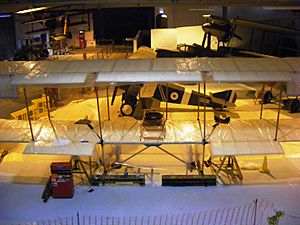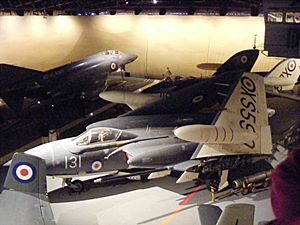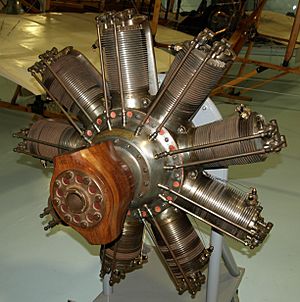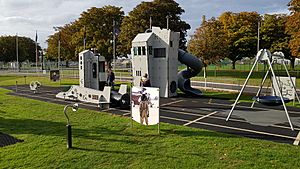Fleet Air Arm Museum facts for kids
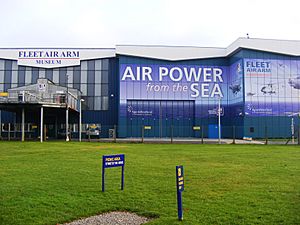 |
|
| Lua error in Module:Location_map at line 420: attempt to index field 'wikibase' (a nil value). | |
| Established | May 1964 |
|---|---|
| Location | RNAS Yeovilton, Somerset, England |
| Type | Aviation museum |
The Fleet Air Arm Museum is a super cool place where you can explore the history of British naval aviation. This means you'll learn all about planes and helicopters used by the Royal Navy! The museum has a huge collection of military and civilian aircraft, powerful engines, and models of planes and aircraft carriers. You can even see real anchors from famous Royal Navy ships like HMS Ark Royal and HMS Eagle.
The museum is located at RNAS Yeovilton airfield. This is a real working air base! You can even watch military aircraft, especially helicopters, taking off and landing from special viewing areas. It's about 7 miles (11 km) north of Yeovil and 40 miles (64 km) south of Bristol.
Contents
Explore the Museum's Amazing Aircraft
The Fleet Air Arm Museum has lots of exciting things to see. As of summer 2025, there are special exhibits about King Charles's time in the Fleet Air Arm and the 1982 Falklands War. This Falklands exhibit brings together five aircraft that were part of that important event.
Here are some of the aircraft you can see in the Falklands War exhibit:
| Type | What it is | Cool Fact |
|---|---|---|
| Westland Wessex HAS.3 | XP142 | This helicopter has real shrapnel damage from the war! |
| Westland Wessex HU.5 | XT765 | Another important helicopter from the Falklands. |
| Westland Sea King HAS.6 | XV663 | Used for rescue missions, it has a unique "Banana Split" paint scheme. |
| BAE Sea Harrier FRS.1 | XZ493 | A famous jet fighter from the Falklands War. |
| Westland Lynx HAS.3 (GMS) | XZ720 | This helicopter has its paint scheme from the 1991 Gulf War. |
The museum's main displays are split into four big areas, each with its own theme.
This hall shows how naval aviation began, from early airships to fabric-covered biplanes and then to modern jets and helicopters. You can see the front part of a Short 184 8359 plane. This plane was built nearby and even flew in the Battle of Jutland in 1916! It was later damaged during the Second World War when its museum was bombed. It's displayed just as it was found, showing its history.
Here are some of the aircraft in Hall 1:
| Type | What it is | Cool Fact |
|---|---|---|
| Short S.27 | Replica | A plane like this made the first takeoff from a moving ship in 1912! |
| Short 184 | 8359 | Only the front part of this plane, bombed during WW2. |
| Sopwith Baby | N2078 | Called "The Jabberwock," flown by Sub Lt Hyams. |
| Supermarine Walrus | L2301 | This plane was used by the Irish Air Corps before the Fleet Air Arm bought it back. |
| Westland Dragonfly HR.5 | VX595 | An early helicopter. |
| Westland Wessex HAS.3 | XP142 | Part of the Falklands exhibit, with shrapnel damage. |
| Westland Wessex HU.5 | XT765 | Another helicopter from the Falklands exhibit. |
| Westland Sea King HAS.6 | XV663 | Used for rescue, with Royal Navy markings on one side and RAF Rescue on the other. |
Hall 2: World War II and Beyond
This hall focuses on the Second World War. There's a special room about Kamikaze pilots, showing a Yokosuka MXY-7 Ohka II aircraft and models of Japanese planes. You can also see letters from Kamikaze pilots. Two aircraft from the Korean War are also here. Near the entrance to Hall 3, you'll find models of British aircraft carriers, showing how these huge ships changed over time.
Some of the aircraft in Hall 2 include:
| Type | What it is | Cool Fact |
|---|---|---|
| de Havilland Sea Vampire I | LZ551/G | This was the third prototype of this jet. |
| Fairey Fulmar | N1854 | The only surviving example of this two-seat fighter! |
| Fairey Swordfish II | HS618 | A famous torpedo bomber from WW2. |
| Focke-Achgelis Fa 330 | A small, unpowered helicopter used for observation. | |
| North American Harvard III | EX976 | An American trainer plane. |
| Grumman Hellcat | KE209 | A powerful American single-seat fighter. |
| Hawker Sea Fury FB.11 | WJ231 | Painted as flown by Lt D T McKeown. |
| Grumman Avenger ECM.6B | XB446 | An American torpedo bomber with D-Day markings. |
| Grumman Martlet I | AL246 | An early American fighter. |
| Vought Corsair | KD431 | You can see its original 1944 paint finish! |
| Yokosuka MXY-7 Ohka II | BAPC 58 | A Japanese Kamikaze aircraft. |
| Mikoyan-Gurevich MiG-15 | A Soviet jet fighter. |
Hall 3: On Board an Aircraft Carrier
This hall is super cool because it's designed to look like the flight deck of the famous aircraft carrier HMS Ark Royal from the 1970s! You enter through a vibrating Wessex helicopter, making you feel like you're really taking off. You can see historic aircraft like the Supermarine Seafire. There are also rooms that look like the ship's "island" (the control tower) with projections, and you can even experience a pretend lift ride to the top of the mock carrier.
Aircraft you can see in Hall 3 include:
| Type | What it is | Cool Fact |
|---|---|---|
| British Aerospace Sea Harrier FA.2 | XZ499 | A later version of the Sea Harrier jet. |
| Blackburn Buccaneer S.1 | XN957 | A British strike aircraft. |
| de Havilland Sea Vixen FAW.2 | XS590 | A twin-boom, two-seat fighter. |
| McDonnell Douglas Phantom FG.1 | XT596 | A powerful American jet fighter used by the UK. |
| Sopwith Pup | N6452 | A replica of an early biplane. |
| Supermarine Attacker F.1 | WA473 | An early jet fighter. |
| Supermarine Seafire F.17 | SX137 | The naval version of the famous Supermarine Spitfire. |
| Westland Wessex HU.5 | XT482 | Nicknamed "Gilbert." |
| Westland Wessex HU.5 | XT769 | This helicopter is your entrance to Hall 3! |
| Westland Wyvern TF.1 | VR137 | A unique turboprop strike aircraft. |
Hall 4: Modern Aviation and Concorde
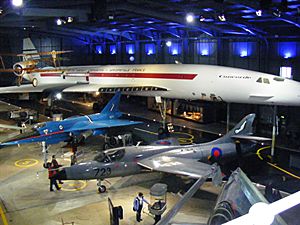
This hall features more modern aircraft, including the amazing Concorde 002!
Here are some of the aircraft on display in Hall 4:
| Type | What it is | Cool Fact |
|---|---|---|
| BAC 221 | WG774 | This plane helped engineers learn about the special "delta wing" shape for Concorde. |
| BAC Concorde | G-BSST | This was the second Concorde ever to fly and the first one built in Britain! It has been on display since 1976. |
| BAE Harrier GR.9A | ZD433 | This Harrier has markings from the Afghanistan war. |
| BAE Sea Harrier FRS.1 | XZ493 | Another Sea Harrier from the Falklands exhibit. |
| Bristol Scout D | N5419 | A reproduction of an early biplane, displayed without its fabric covering. |
| Hawker Siddeley P.1127 | XP980 | This plane was important in developing the Harrier jet. |
| Westland Sea King HC.4 | ZA298 | A large transport helicopter. |
| Westland Lynx HAS.3 (GMS) | XZ720 | Part of the Falklands exhibit, with its 1991 Gulf War paint scheme. |
Other Cool Displays to See
Besides the main halls, there are other interesting areas:
- "Barracuda Live - The Big Rebuild": Watch as experts actively restore a Fairey Barracuda plane!
- Battle of Taranto: Learn about a famous World War II event where the Fleet Air Arm played a key role. You can see a Fairey Swordfish here.
- "Merlin Experience": Discover how modern helicopters find submarines underwater.
- "Operation Skua": See how a Blackburn Skua plane was recovered after crashing.
- "Pioneers to Professionals: Women of the Royal Navy": Learn about the important roles women have played.
- "Saved! 100 years of Search and Rescue": This display features three helicopters and even has a fun soft play area for younger kids!
- "Welcome Gallery": The first area you see when you enter.
Aircraft in the Reserve Collection
The museum also has many aircraft that are being restored or are not currently on public display. These are kept in a special building called Cobham Hall. Sometimes, you can get a chance to see them during special open days!
Here are some of the aircraft in the reserve collection:
- Beech T-34C-1 Turbo-Mentor 0729
- Bell UH-1H Iroquois AE-422
- Bell Sioux AH.1 XT176
- Bensen B.8M G-AZAZ
- Blackburn NA.39 XK488
- de Havilland Sea Venom FAW.21 WW138
- de Havilland Sea Vixen FAW.1 XJ481
- de Havilland Tiger Moth T.2 XL717
- de Havilland Sea Vampire T.22 XA129
- Douglas Skyraider AEW.1 WV106
- Douglas Skyraider AEW.1 WT121
- Fairey Albacore N4389
- Fairey Barracuda II DP872
- Fairey Barracuda II LS931
- Fairey Firefly TT.4 VH127
- Fairey Firefly TT.1 Z2033
- Fairey Flycatcher (replica) S1287
- Fairey Gannet AEW.3 XL503
- Fairey Gannet COD.4 XA466
- Gloster Meteor T.7 WS103
- Gloster Meteor TT.20 WM292
- Handley Page HP.115 XP980
- Hawker P.1052 VX272
- Hawker Hunter T.8M XL580
- Hawker Sea Hawk FGA.6 XE340
- Hawker Sea Hawk FGA.6 WV856
- Hawker Siddeley Buccaneer S.2B XV333
- Hawker Siddeley Harrier T.8N ZB604
- Hiller HTE1 XB480
- Hunting Jet Provost T.3A XN462
- Northrop Chukar XW994
- Northrop Shelduck XS574
- Percival Sea Prince T1 WP313
- Saro P.531 XN332
- Saro P.531 XN334
- Sopwith Camel (replica) B6401
- Sopwith Triplane (replica) N5459
- Super Eagle Hang Glider G-BGWZ
- Supermarine 510 VV106
- Supermarine Scimitar F.1 XD317/112/R
- Westland Gazelle HT.2 XW864
- Westland Lynx HAS.3 XZ699
- Westland Sea King HAS.5 XZ574
- Westland Wasp HAS.1 XS527
- Westland Wasp HAS.1 XT427
- Westland Wasp HAS.1 XT778
- Westland Wessex HU.5 XS508
- Westland Whirlwind HAR.1 XA864
- Westland Whirlwind HAR.3 XG574
- Westland Whirlwind HAS.7 XG594
- Westland Whirlwind HAS.7 XL853
Engines on Display
The museum also has many different aero engines on display throughout the halls. These are the powerful machines that make planes fly!
- Alvis Leonides
- Armstrong Siddeley Cheetah
- Bristol Centaurus
- Bristol Mercury
- Bristol Siddeley BS.100
- Clerget 9B
- Bristol Siddeley Pegasus
- de Havilland Gipsy Major
- de Havilland Gipsy Queen
- Rolls-Royce Avon
- Rolls-Royce Nene
- Rolls-Royce Merlin
- Rolls-Royce/Snecma Olympus 593
- Sunbeam Gurkha
- Wright R-1820 Cyclone
What Else Can You Do at the Museum?
Aircraft Restoration Work
The museum has a team that works to restore old aircraft. For example, a Corsair KD 431 was restored and shown in 2006, looking just like it did in 1944! In 2025, they are working on a Fairey Barracuda and a Gloster Sea Gladiator. You can peek into their workshop between Hall 3 and Hall 4 to see them in action!
Museum Archives
The Fleet Air Arm Museum also keeps a huge collection of historical documents and materials about naval aviation.
Visitor Fun and Facilities
The museum has a shop where you can find lots of cool naval-themed items, including books and documentaries. There's also an outdoor adventure playground for kids and two cafés where you can grab a snack or a drink.
Other Aviation Museums
- Naval aviation museums around the world
- Australia - Fleet Air Arm Museum (Australia), in Nowra, New South Wales
- Canada - Shearwater Aviation Museum, in Sheerwater, Nova Scotia
- Germany - Aeronauticum, in Nordholz
- India - Naval Aviation Museum (India), in Goa, India
- USA - National Naval Aviation Museum, in Naval Air Station Pensacola, Florida
- USA - Patuxent River Naval Air Museum, in Lexington Park, Maryland
- British military aviation museums
- Army Flying Museum
- Imperial War Museum:
- REME Museum
- Royal Air Force Museum Cosford and Royal Air Force Museum London
- Other related lists
- List of aviation museums
- List of museums in Somerset
 | DeHart Hubbard |
 | Wilma Rudolph |
 | Jesse Owens |
 | Jackie Joyner-Kersee |
 | Major Taylor |


